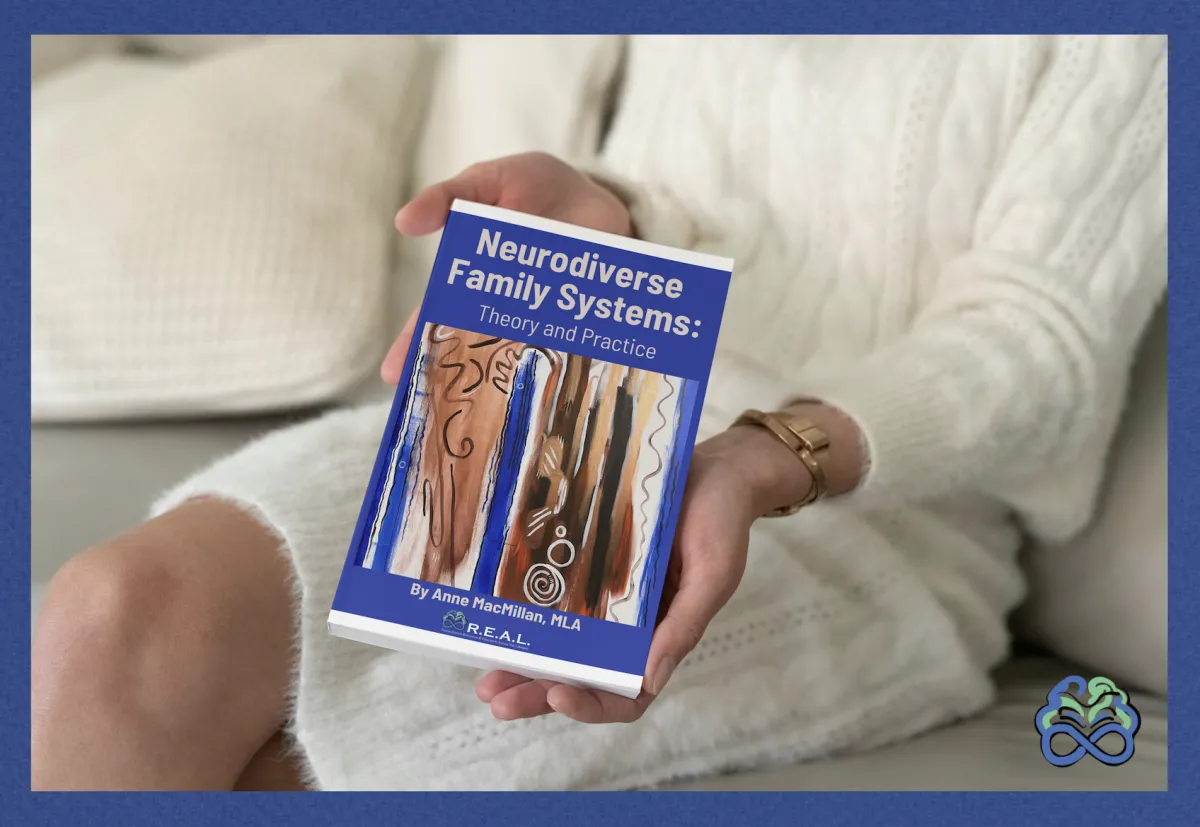
MacMillan's 10-Step Neurodiverse Family Systems Approach:
A Comprehensive Framework
to support neurodivergents and their families throughout adulthood.

Anne MacMillan, MLA
Founder of the 10-Step Neurodiverse Family Systems Approach, Speaker, Researcher, Consultant, Coach, Educator and Expert Witness
About Anne MacMillan
I built my original Neurodiverse Family Systems Theory on my education, personal life experience, and the professional experience I gained in the private neurodiverse services practice I founded in 2017.
Today, my services extend to support other professionals who have come to the new realization that neurodiversity is at the heart of many of the relationship challenges their adult clients face. Professionals can earn my Neurodiverse Family Systems Educator Credential (NFS-E) then use my practical 10-Step educational system, including quantitative assessments and support resources, to help their clients comprehend their relationship challenges and find the happiness and peace they deserve.
I have a research-based master's in psychology from Harvard University and studied developmental psychology as an undergrad. I received the Director's Thesis Award at Harvard for my original research on Level 1 autism and intimate life partnerships -- some of the first quantitative research on the subject in the world.
Altogether, I have over 50 years of personal life experience with neurodiverse family systems, over 20 years of personal life experience with neurodiverse intimate life partnerships, and 8 years of professional experience working with individuals managing the challenges of neurodiverse family systems.
I self-identify as a high body empathetic neurodivergent who just might also be a bit attention neurodivergent (ADHD). I am not autistic.
Our Services
Level 1 autism has a significant impact on dating, marriage, parenting, separation and divorce. Yet many individuals in neurodiverse intimate life partnerships (or life partnerships between autistics and non-autistics) had no idea that one partner was on the spectrum before tying the knot. Professionals, confused by the autism and Neurodiverse Relationship Dynamics (NRD), have offered misdiagnoses and poor advice, adding to the burden Level 1 autistics and their family members have faced.
Likewise, Level 1 autistic adults have little career support, facing the work world with little to no recognition that their autism affects their professional relationships.
R.E.A.L. Neurodiverse seeks to provide services that support these unmet needs.
MacMillan's Neurodiverse Family Systems Theory
Autistics and non-autistics perceive and navigate the social world differently. These differences create a phenomenon I term 'Neurodiverse Relationship Dynamics' (NRD).
Due to differences in neurological functioning, and at no fault of any family member, NRD contribute to perpetual cycles punctuated by emotional explosions called 'intermittent trauma spikes.'
Autistics and non-autistics also experience empathy differently, with autistics experiencing what emotion-sharing empathy' and non-autistics experiencing 'body empathy.' Empathy differences as well as different levels of 'empathic-emotion intensity' and 'emotion-origin awareness' can contribute to the trauma experienced during intermittent trauma spikes.
Both non-autistics and autistics can engage in harmful narcissistic behaviors within neurodiverse family systems. Increasing awareness of NRD can support all family members in reducing the level of narcissistic behaviors and in responding to them appropriately.
Neurodiverse families are commonly made up of three primary types of neurodivergents: autistics, attention neurodivergents (ADHD), and high body empathetics. And, of course, sometimes other neurodivergents and true neurotypicals crop up in neurodiverse famlies as well. All members of neurodiverse families need and deserve support regardless of neurology.
The tendency for individuals to select intimate life partners that are familiar to them alongside the fact that neurodiversity has a genetic component means that individuals from neurodiverse families commonly have children with other individuals from neurodiverse families, passing neurodiversity from generation to generation and creating the phenomenon of neurotribes.
Individuals in neurodiverse families commonly take upon themselves particular roles associated with both individual and systemic functions within their neurodiverse family systems. These roles are facilitated by the different neurologies and are more intractable than roles in neurotypical families. Gaining awareness of the roles and their functions can support individuals in neurodiverse family systems as they make sense of the relationship confusion they are experiencing and then make decisions and take actions to improve their lives.
Most professional services are designed with neurotypicals from neurotypical families in mind, abandoning neurodivergents from neurodiverse families to inadequate supports that tend to be irrelevant to their actual family experience and the relationship challenges they face in their daily lives.
I believe the first step to overcoming all this confusion is to have a foundational understanding of empathy differences, Neurodiverse Relationship Dynamics (NRD), and the manner in which trauma and multigenerational behavioral patterns (facilitated by neurodiversity) affect neurodivergents within neurodiverse family systems.
My original Neurodiverse Family Systems Theory and my 10-Step Neurodiverse Family Systems Approach seek to fill this gap and to provide professionals and members of neurodiverse families the information they need so all individuals from neurodiverse families can find the happiness and peace they deserve.

Anne MacMillan, MLA
Founder of the R.E.A.L. 10-Step Neurodiverse Family Systems Approach, Speaker, Researcher, Consultant, Coach, Educator and Expert Witness

MacMillan's 10-Step
Neurodiverse Family Systems Approach

Autism, Mindblindness and Relationships
Theory of mind is the ability to perceive what the world is like from other people's perspectives.
What is mindblindness?
Adults with high-functioning autism have theory of mind deficits or “mindblindness” and theory of mind deficits have a major impact on marriage and adult relationships.
Theory of mind is the ability to perceive what the world is like from other people’s perspectives. People with autism are aware of their own perspective, but have a difficult time understanding where other people are coming from. Theory of mind deficits prevent a spouse with autism from understanding where a neurotypical spouse is coming from in social interactions. They prevent people with autism from easily understanding others’ emotions or intentions (Baron-Cohen, 1995; Frith & Happe, 1999). They affect the way the partner with autism speaks and behaves in the marriage.
People with autism tend to make decisions based only on the way they see the world, what they intend and how they feel. They tend to think that their positions are reasonable and others’ positions are unreasonable even when an objective outsider would adamantly disagree.
Neurotypical spouses who do not have theory of mind deficits are able to see the world from their own perspective and the partner with autism’s perspective and will try to take both positions into account when resolving problems or making decisions. Many times, however, the person with autism will not accept a resolution that takes anyone else’s perspective into account.
Neurotypical family members are generally incentivized to keep family members with autism feeling satisfied and peaceful. Neurotypical partners experience relief when partners with autism are feeling calm and well because solving problems in neurodiverse relationships can be so difficult that it may seem preferable to live with problems in order to keep the peace.
Partners with autism generally feel taken advantage of and exploited. Without easy access to their partners’ perspectives, their own wants and needs seem of much higher importance. They can feel manipulated, abused and controlled without understanding or perceiving their partners’ service and intentions.

Pre-Order Your
Copy Today
Neurodiverse Family Systems: Theory and Practice
By Anne MacMillan, MLA
© 2024 R.E.A.L. Neurodiverse
All Rights Reserved
anne@REALneurodiverse.com
Text or Call: (617) 996-7239 (United States)
